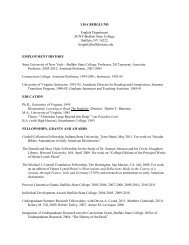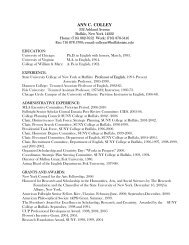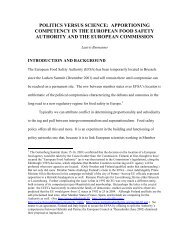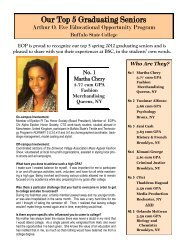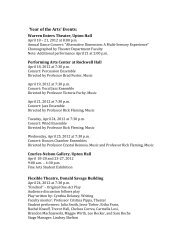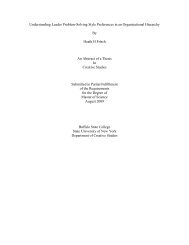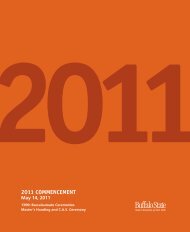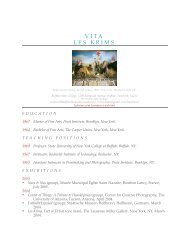Arts - Buffalo State College
Arts - Buffalo State College
Arts - Buffalo State College
You also want an ePaper? Increase the reach of your titles
YUMPU automatically turns print PDFs into web optimized ePapers that Google loves.
120<br />
Psychology and Social Sciences<br />
Racism Against Indigenous Students At the<br />
Universidad San Francisco De Quito<br />
Erica Hernandez, Anthropology<br />
Faculty Mentor: Professor Lisa Anselmi, Anthropology<br />
Race relations in Latin America vary widely in severity according<br />
to the geographical area that is being studied. Nationally, Ecuador is<br />
considered a mestizo nation. However, it is also an ethnically diverse<br />
country with minority groups of Indigenous and Afro-Ecuadorian<br />
people. The Indigenous population in Ecuador continues to<br />
overcome the racial inequalities that have afflicted the country since<br />
colonial times. Previous studies have explored racism in primary<br />
and secondary schools in Ecuador; however, there is a lack of<br />
literature regarding Indigenous students at the university level. This<br />
pilot project examined how indigenous students at the Universidad<br />
San Francisco de Quito, a private institution, perceive racism and<br />
discrimination and its connection to traditional Indigenous clothing.<br />
It is hypothesized that those who wear traditional Indigenous<br />
clothing are more likely to experience racism and discriminatory<br />
actions against them than those who wear regular or mestizo<br />
clothing.<br />
Presentation Type and Session: Poster III<br />
Religious Coping With Academic Stressors<br />
and Student Self-Efficacy<br />
Pamela Mordick, Psychology<br />
Faculty Mentor: Professor Jill Norvilitis, Psychology<br />
This study examines the relationship between external and<br />
internal religiosity of college students and students’ ability to cope<br />
and adjust to school and their level of academic self-efficacy. Prior<br />
research indicates that greater stress in life may negatively affect<br />
physical and mental health, and repeated stress may lead to personal<br />
failure. However, some studies show that religious and spiritual<br />
coping may reduce stress and depression. Further, effective problem<br />
solving has been shown to be a significant protective factor against<br />
the negative effects of stressors. In addition, those who have less<br />
self-doubt in their abilities have a greater self-efficacy and students<br />
who start school with a strong sense of academic self-efficacy excel<br />
toward their goals more so than their classmates. The present study<br />
will combine these concepts and examine the relationship between<br />
intrinsic and extrinsic religious coping skills and college students’<br />
academic achievement and adjustment. Data are being collected<br />
and results will be presented at the Student Research and Creativity<br />
Celebration.<br />
Presentation Type and Session: Poster V<br />
Safe Space: A Creative Approach<br />
To Bullying Intervention In a Virtual<br />
Environment<br />
Ted Mallwitz, Creative Studies<br />
Faculty Mentor: Professor Cyndi Burnett, Creative Studies<br />
Bullying is an ever present and growing concern for educators,<br />
parents, and students. The Internet presents new mediums for<br />
bullying through social networking and online communication.<br />
If the Internet has become part of the problem of bullying, then<br />
how might it also present new solutions? This research is aimed<br />
at presenting new means for online bullying intervention and<br />
prevention through the use of the virtual collaboration software Qube<br />
(formerly Openqwaq). Through the creation of virtual communities<br />
for schools students can interact with educators, counselors, and<br />
peers to address bullying issues. The use of this online medium may<br />
be able to create a virtual safe space where students feel comfortable<br />
coming forward about bullying as well as present a forum where<br />
educators can communicate with students in new ways. This<br />
presentation will include a brief introduction and video presentation<br />
of the Safe Space to be created using the Qube software.<br />
Presentation Type and Session: Oral – Social Sciences<br />
The Sex Offender Registry: Policy,<br />
Punishment, and Effectiveness<br />
Ciera Sundquist, HON 400: All <strong>College</strong> Honors Colloquium<br />
Faculty Mentors: Professor Kathleen Contrino, Criminal Justice and<br />
Professor Andrea Guiati, Director, All <strong>College</strong> Honors Program<br />
We can access it online, find it in newspapers, get email alerts,<br />
and even download apps for our phones, but is the sex offender<br />
registry really effective in preventing offenders from recidivating? Sex<br />
offender registries were created in order to protect society, especially<br />
children, against sex offenders but the effectiveness of these laws<br />
has come into question. This is, in part, due to the fact that sex<br />
offender registries operate on the theory of rational choice, while<br />
sexual offenders may be motivated by other criminological theories.<br />
In order for a punishment to be effective it must be grounded in<br />
the same criminological theory as the offense connected to that<br />
punishment. However, root causes of Pedaphilia and the deterrent<br />
effects of a sex offender registry may not be related theorectically<br />
thus making registries ineffective. This poster will primarily examine<br />
criminological theories and policies behind the sex offender registries<br />
in order to come to a more complete understanding about them.<br />
In addition this poster will present theories and motivations behind<br />
pedaphilia, as well as data related to recidivism rates, in order to<br />
discuss the effectiveness of sex offender registry policies.<br />
Presentation Type and Session: Poster I




